- Home
- H. Rider Haggard
Jess Page 3
Jess Read online
Page 3
CHAPTER III
MR. FRANK MULLER
John Niel woke early the next morning, feeling as sore and stiffas though he had been well beaten and then wrapped up tight inhorse-girths. He made shift, however, to dress himself, and then, withthe help of a stick, limped through the French windows that opened fromhis room on to the verandah, and surveyed the scene before him. It wasa delightful spot. At the back of the stead was the steep boulder-strewnface of the flat-topped hill that curved round on each side, embosominga great slope of green, in the lap of which the house was placed. Itwas very solidly built of brown stone, and, with the exception of thewaggon-shed and other outbuildings which were roofed with galvanisediron, that shone and glistened in the rays of the morning sun in a waythat would have made an eagle blink, was covered with rich brown thatch.All along its front ran a wide verandah, up the trellis-work of whichgreen vines and blooming creepers trailed pleasantly, and beyond was thebroad carriage-drive of red soil, bordered with bushy orange-trees ladenwith odorous flowers and green and golden fruit. On the farther sideof the orange-trees were the gardens, fenced in with low walls of roughstone, and the orchard planted with standard fruit-trees, and beyondthese again the oxen and ostrich kraals, the latter full of long-neckedbirds. To the right of the house grew thriving plantations of blue-gumand black wattle, and to the left was a broad stretch of cultivatedlands, lying so that they could be irrigated for winter crops by meansof water led from the great spring that gushed out of the mountain-sidehigh above the house, and gave its name of Mooifontein to the place.
All these and many more things John Niel saw as he looked out from theverandah at Mooifontein, but for the moment at any rate they were lostin the wild and wonderful beauty of the panorama that rolled away formiles and miles at his feet, till it was bounded by the mighty range ofthe Drakensberg to the left, tipped here and there with snow, and by thedim and vast horizon of the swelling Transvaal plains to the right andfar in front of him. It was a beautiful sight, and one to make the bloodrun in a man's veins, and his heart beat happily because he was aliveto see it. Mile upon mile of grass-clothed veldt beneath, bending andrippling like a corn-field in the quick breath of the morning, spaceupon space of deep-blue sky overhead with ne'er a cloud to dim it, andthe swift rush of the wind between. Then to the left there, impressiveto look on and conducive to solemn thoughts, the mountains rear theircrests against the sky, and, crowned with the gathered snows of thecenturies whose monuments they are, from aeon to aeon gaze majesticallyout over the wide plains and the ephemeral ant-like races who treadthem, and while they endure think themselves the masters of their littleworld. And over all--mountain, plain, and flashing stream--the gloriouslight of the African sun and the Spirit of Life moving now as it oncemoved upon the darkling waters.
John stood and gazed at the untamed beauty of the scene, in his mindcomparing it to many cultivated prospects which he had known, and comingto the conclusion that, however desirable the presence of civilised manmight be in the world, it could not be said that his operations reallyadd to its beauty. For the old line, "Nature unadorned adorned themost," still remains true in more senses than one.
Presently his reflections were interrupted by the step of SilasCroft, which, notwithstanding his age and bent frame, still rang firmenough--and he turned to greet him.
"Well, Captain Niel," said the old man, "up already! It looks well ifyou mean to take to farming. Yes, it's a pretty view, and a pretty placetoo. Well, I made it. Twenty-five years ago I rode up here and saw thisspot. Look, you see that rock there behind the house? I slept under itand woke at sunrise and looked out at this beautiful scene and at thegreat veldt (it was all alive with game then), and I said to myself,'Silas, for five-and-twenty years have you wandered about this greatcountry, and now you are getting tired of it; you've never seen a fairerspot than this or a healthier; be a wise man and stop here.' And so Idid. I bought the 3,000 _morgen_ (6,000 acres), more or less, for 10pounds down and a case of gin, and I set to work to make this place, andyou see I have made it. Ay, it has grown under my hand, every stone andtree of it, and you know what that means in a new country. But one wayor another I have done it, and now I have grown too old to manage it,and that's how I came to give out that I wanted a partner, as Mr. Snowtold you down in Durban. You see, I told Snow it must be a gentleman; Idon't care much about the money, I'll take a thousand for a third shareif I can get a gentleman--none of your Boers or mean whites for me. Itell you I have had enough of Boers and their ways; the best day of mylife was when old Shepstone ran up the Union Jack there in Pretoria andI could call myself an Englishman once more. Lord! and to think thatthere are men who are subjects of the Queen and want to be subjects ofa Republic again--Mad! Captain Niel, I tell you, quite mad! However,there's an end of it all now. You know what Sir Garnet Wolseley toldthem in the name of the Queen up at the Vaal River, that this countrywould remain English until the sun stood still in the heavens and thewaters of the Vaal ran backwards.[*] That's good enough for me, for, asI tell these grumbling fellows who want the land back now that we havepaid their debts and defeated their enemies, no English government isfalse to its word, or breaks engagements solemnly entered into by itsrepresentatives. We leave that sort of thing to foreigners. No, no,Captain Niel, I would not ask you to take a share in this place if Iwasn't sure that it would remain under the British flag. But we willtalk of all this another time, and now come in to breakfast."
[*] A fact.--Author.
After breakfast, as John was far too lame to walk about the farm, thefair Bessie suggested that he should come and help her to wash a batchof ostrich feathers, and, accordingly, off he went. The _locus operandi_was in a space of lawn at the rear of a little clump of _naatche_orange-trees, of which the fruit is like that of the Maltese orange,only larger. Here were placed an ordinary washing-tub half-filled withwarm water, and a tin bath full of cold. The ostrich feathers, many ofwhich were completely coated with red dirt, were plunged first into thetub of warm water, where John Niel scrubbed them with soap, and thentransferred to the tin bath, where Bessie rinsed them and laid them ona sheet in the sun to dry. The morning was very pleasant, and John sooncame to the conclusion that there are many more disagreeable occupationsin the world than the washing of ostrich feathers with a lovely girl tohelp you. For there was no doubt but that Bessie was lovely, looking avery type of happy, healthy womanhood as she sat opposite to him on thelittle stool, her sleeves rolled up almost to the shoulder, showinga pair of arms that would not have disgraced a statue of Venus, andlaughed and chatted away as she washed the feathers. Now, John Niel wasnot a susceptible man: he had gone through the fire years before andburnt his fingers like many another confiding youngster but, all thesame, he did wonder as he knelt there and watched this fair girl, whosomehow reminded him of a rich rosebud bursting into bloom, how longit would be possible to live in the same house with her without fallingunder the spell of her charm and beauty. Then he began to think of Jess,and of what a strange contrast the two were.
"Where is your sister?" he asked presently.
"Jess? Oh, I think that she has gone to the Lion Kloof, reading orsketching, I don't know which. You see in this establishment I representlabour and Jess represents intellect," and she nodded her head prettilyat him, and added, "There is a mistake somewhere, she got all thebrains."
"Ah," said John quietly, and looking up at her, "I don't think that youare entitled to complain of the way in which Nature has treated you."
She blushed a little, more at the tone of his voice than the words, andwent on hastily, "Jess is the dearest, best, and cleverest woman in thewhole world--there. I believe that she has only one fault, and it isthat she thinks too much about me. Uncle said that he had told you howwe came here first when I was eight years old. Well, I remember thatwhen we lost our way on the veldt that night, and it rained so and wasso cold, Jess took off her own shawl and wrapped it round me over myown. Well, it has been just like that with her always. I am always tohave the shawl--ever
ything is to give way to me. But there, that is Jessall over; she is very cold, cold as a stone I sometimes think, but whenshe does care for anybody it is enough to frighten one. I don't know agreat number of women, but somehow I do not think that there can be manyin the world like Jess. She is too good for this place; she ought to goaway to England and write books and become a famous woman, only----"she added reflectively, "I am afraid that Jess's books would all be sadones."
Just then Bessie stopped talking and suddenly changed colour, the bunchof lank wet feathers she held in her hand dropping from it with a littlesplash back into the bath. Following her glance, John looked down theavenue of blue-gum trees and perceived a big man with a broad hat andmounted on a splendid black horse, cantering leisurely towards thehouse.
"Who is that, Miss Croft?" he asked.
"It is a man I don't like," she said with a little stamp of her foot."His name is Frank Muller, and he is half a Boer and half an Englishman.He is very rich, and very clever, and owns all the land round thisplace, so uncle has to be civil to him, though he does not like himeither. I wonder what he wants now."
On came the horse, and John thought that its rider was going to passwithout seeing them, when suddenly the movement of Bessie's dressbetween the _naatche_ trees caught his eye, and he pulled up and lookedround. He was a large and exceedingly handsome man, apparently aboutforty years old, with clear-cut features, cold, light-blue eyes, and aremarkable golden beard that hung down over his chest. For a Boer hewas rather smartly dressed in English-made tweed clothes, and tallriding-boots.
"Ah, Miss Bessie," he called out in English, "there you are, with yourpretty arms all bare. I'm in luck to be just in time to see them. ShallI come and help you to wash the feathers? Only say the word, now----"
Just then he caught sight of John Niel, checked himself, and added:
"I have come to look for a black ox, branded with a heart and a 'W'inside of the heart. Do you know if your uncle has seen it on the placeanywhere?"
"No, _Meinheer_ Muller," replied Bessie, coldly, "but he is down there,"pointing at a kraal on the plain some half-mile away, "if you want to goand ask about it."
"_Mr._ Muller," said he, by way of correction, and with a curiouscontraction of the brow. "'_Meinheer_' is very well for the Boers, butwe are all Englishmen now. Well, the ox can wait. With your permission,I'll stop here till _Oom_ Croft (Uncle Croft) comes back," and, withoutfurther ado, he jumped off his horse and, slipping the reins over itshead as an indication to it to stand still, advanced towards Bessie withan outstretched hand. As he came the young lady plunged both her armsup to the elbow in the bath, and it struck John, who was observing thescene closely, that she did this in order to avoid the necessity ofshaking hands with her stalwart visitor.
"Sorry my hands are wet," she said, giving him a cold little nod. "Letme introduce you, Mr. (with emphasis) Frank Muller--Captain Niel--whohas come to help my uncle with the place."
John stretched out his hand and Muller shook it.
"Captain," he said interrogatively--"a ship captain, I suppose?"
"No," said John, "a Captain of the English Army."
"Oh, a _rooibaatje_ (red jacket). Well, I don't wonder at your taking tofarming after the Zulu war."
"I don't quite understand you," said John, rather coldly.
"Oh, no offence, Captain, no offence. I only meant that you_rooibaatjes_ did not come very well out of that war. I was there withPiet Uys, and it was a sight, I can tell you. A Zulu had only to showhimself at night and one would see your regiments _skreck_ (stampede)like a span of oxen when they wind a lion. And then they'd fire--ah,they did fire--anyhow, anywhere, but mostly at the clouds, there was nostopping them; and so, you see, I thought that you would like to turnyour sword into a ploughshare, as the Bible says--but no offence, I'msure--no offence."
All this while John Niel, being English to his backbone, and cherishingthe reputation of his profession almost as dearly as his own honour,was boiling with inward wrath, which was all the fiercer because he knewthere was some truth in the Boer's insults. He had the sense, however,to keep his temper--outwardly, at any rate.
"I was not in the Zulu war, Mr. Muller," he said, and just then oldSilas Croft rode up, and the conversation dropped.
Mr. Frank Muller stopped to dinner and far on into the afternoon, forhis lost ox seemed to have entirely slipped his memory. There he satclose to the fair Bessie, smoking and drinking gin-water, and talkingwith great volubility in English sprinkled with Boer-Dutch terms thatJohn Niel did not understand, and gazing at the young lady in a mannerwhich John somehow found unpleasant. Of course it was no affair of his,and he had no interest in the matter, but for all that he thought thisremarkable-looking Dutchman exceedingly disagreeable. At last, indeed,he could bear it no longer, and hobbled out for a little walk with Jess,who, in her abrupt way, offered to show him the garden.
"You don't like that man?" she said to him, as they went slowly down theslope in front of the house.
"No; do you?"
"I think," replied Jess quietly, but with much emphasis, "that he isthe most odious man I ever saw--and the most curious." Then she relapsedinto silence, only broken now and again by an occasional remark aboutthe flowers and trees.
Half an hour afterwards, when they arrived again at the top of theslope, Mr. Muller was just riding off down the avenue of blue gums. Bythe verandah stood a Hottentot named Jantje, who had been holding theDutchman's horse. He was a curious, wizened-up little fellow, dressedin rags, and with hair like the worn tags of a black woollen carpet.His age might have been anything between twenty-five and sixty; it wasimpossible to form any opinion on the point. Just now, however,his yellow monkey face was convulsed with an expression of intensemalignity, and he was standing there in the sunshine cursing rapidlybeneath his breath in Dutch, and shaking his fist after the form of theretreating Boer--a very epitome of impotent but overmastering passion.
"What is he doing?" asked John.
Jess laughed, and answered, "Jantje does not like Frank Muller any morethan I do, but I don't know why. He will never tell me."

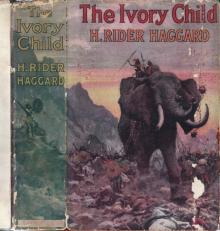 The Ivory Child
The Ivory Child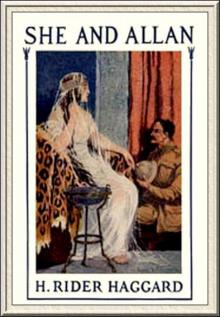 She and Allan
She and Allan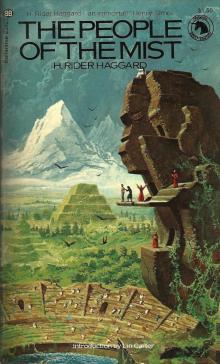 The People of the Mist
The People of the Mist She
She Morning Star
Morning Star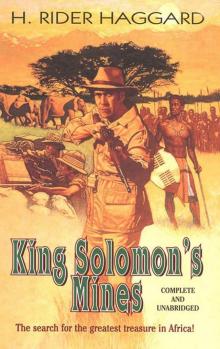 King Solomon's Mines
King Solomon's Mines She: A History of Adventure
She: A History of Adventure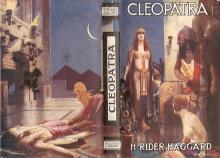 Cleopatra
Cleopatra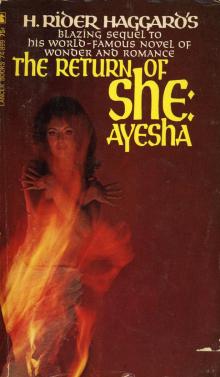 Ayesha, the Return of She
Ayesha, the Return of She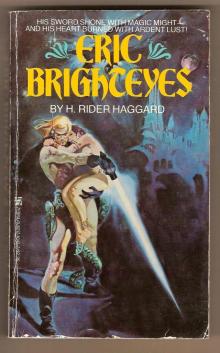 Eric Brighteyes
Eric Brighteyes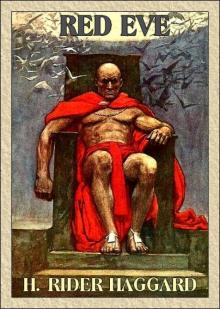 Red Eve
Red Eve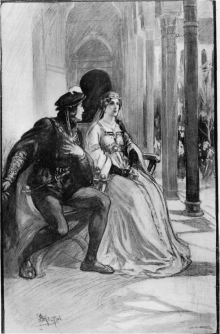 Fair Margaret
Fair Margaret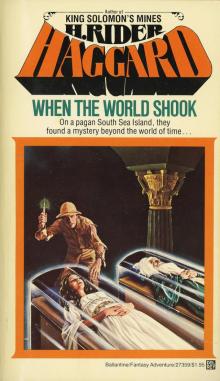 When the World Shook
When the World Shook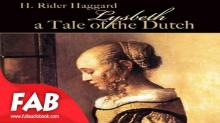 Lysbeth, a Tale of the Dutch
Lysbeth, a Tale of the Dutch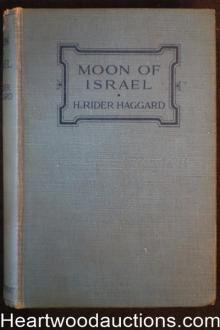 Moon of Israel: A Tale of the Exodus
Moon of Israel: A Tale of the Exodus Long Odds
Long Odds The Ghost Kings
The Ghost Kings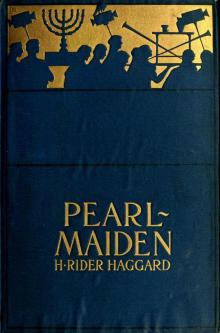 Pearl-Maiden: A Tale of the Fall of Jerusalem
Pearl-Maiden: A Tale of the Fall of Jerusalem Allan and the Holy Flower
Allan and the Holy Flower Smith and the Pharaohs, and other Tales
Smith and the Pharaohs, and other Tales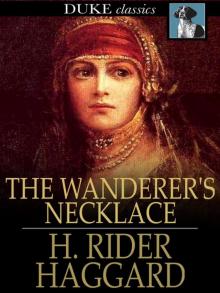 The Wanderer's Necklace
The Wanderer's Necklace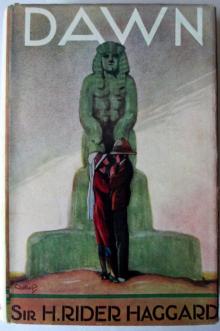 Dawn
Dawn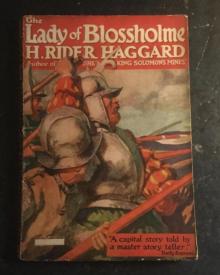 The Lady of Blossholme
The Lady of Blossholme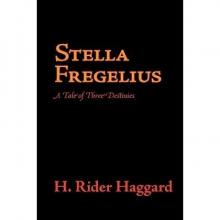 Stella Fregelius: A Tale of Three Destinies
Stella Fregelius: A Tale of Three Destinies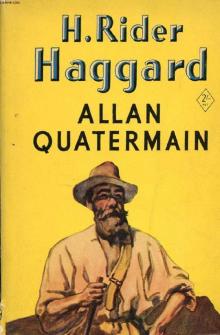 Allan Quatermain
Allan Quatermain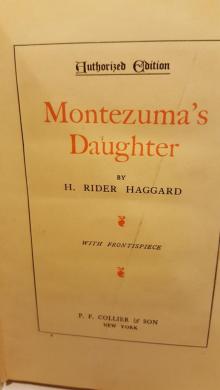 Montezuma's Daughter
Montezuma's Daughter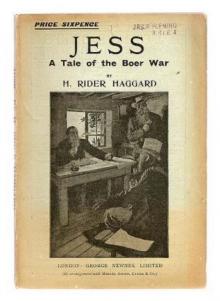 Jess
Jess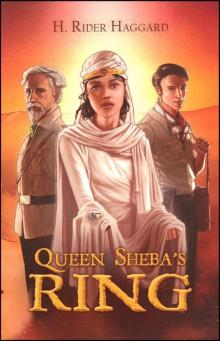 The Brethren
The Brethren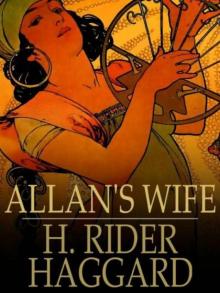 Allan's Wife
Allan's Wife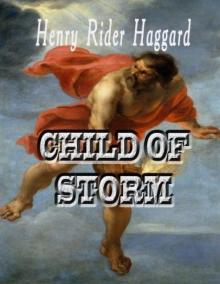 Child of Storm
Child of Storm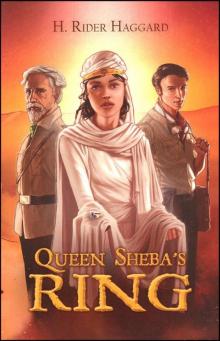 Queen Sheba's Ring
Queen Sheba's Ring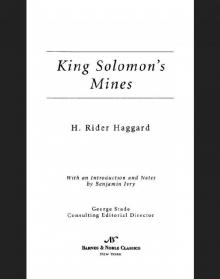 King Solomon's Mines (Barnes & Noble Classics Series)
King Solomon's Mines (Barnes & Noble Classics Series)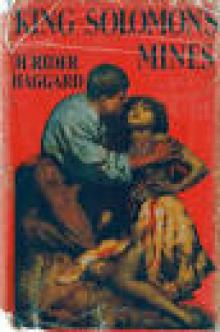 Complete Allan Quatermain Omnibus - Volumes 1 - 10
Complete Allan Quatermain Omnibus - Volumes 1 - 10